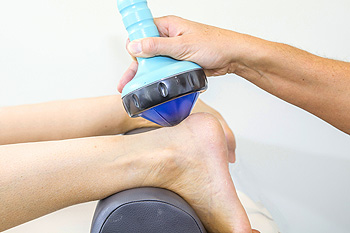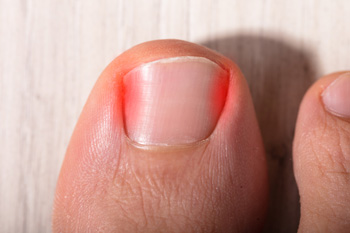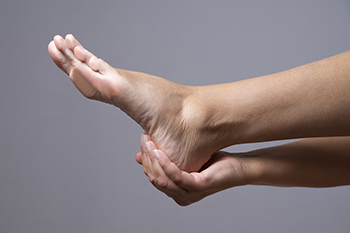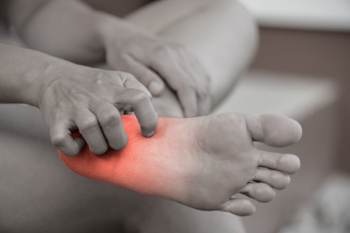Connect With Us
Items filtered by date: August 2023
Plantar Fasciitis May Be Helped With Shockwave Therapy

A small percentage of people who have plantar fasciitis experience little or no positive response to ordinary treatment. An option to consider may be to have Extracorporeal Shock Wave Therapy (ESWT) performed. This can be a successful treatment for this type of foot condition. Shockwave therapy is administered by targeting shock waves into the damaged tissue surrounding the plantar fascia. This procedure generally takes about 20 minutes and anesthesia is typically not needed if the treatment is low impact. Conversely, with high-intensity treatment, general anesthesia may be needed as a result of the pain that may be felt. Patients have experienced little or no downtime after the session, however, several treatments may be needed for permanent relief. Possible side effects may include swelling, redness, and slight bruising at the treatment site. If you suffer from heel pain, please consult with a podiatrist who can determine if shockwave therapy is right for you.
Shockwave therapy is a treatment commonly used to treat various injuries and conditions, particularly plantar fasciitis in the feet. To learn more, consult with one of our podiatrists from The Podiatry Center, PC. Our doctors can provide the care you need to keep you pain-free and on your feet.
Shockwave Therapy
Shockwave therapy is a new treatment option designed to treat bone conditions such as tennis elbow, shoulder pain, and others. Shockwave therapy uses high intensity sound waves that are directed to the affected tissues of the body with pinpoint accuracy. The effects are very beneficial, leading to a production of collagen fibers, eliminating inflammation.
Who Benefits from Shockwave?
Shockwave is recommended for patients suffering from heel pain and associated problems. Heel pain is a common condition which can be caused by obesity, overexertion, and spending a substantial amount of time on hard floors with your feet exposed and unsupported.
Fast and Easy
The therapy is actually a simple process that can leave patients feeling better the very next day. Shockwave therapy is not as dramatic as it sounds. It enables more blood flow to effected areas, addressing the source of the problem and allowing treatment to last for a long time.
Treatment & Recovery Time
Shockwave treatment will enable your feet to recover quickly. This is especially important since surgery is not required. It is cost effective and does not require the use of anesthesia. This treatment is a better option to surgery, since it is proven safe.
If you have any questions, please feel free to contact our office located in Millburn, NJ . We offer the newest diagnostic and treatment technologies for all your foot and ankle needs.
Are You Suffering From Ingrown Toenails?
Causes and Treatments for Ingrown Toenails

Within the world of common foot woes, ingrown toenails stand as a painful and bothersome issue that can disrupt daily life. These occur when the edges of a toenail grow into the surrounding skin, leading to inflammation and discomfort. Often stemming from improper nail trimming, wearing tight footwear, or genetic reasons, ingrown toenails can bring about pain, swelling, and possibly infection. Treating this condition involves gentle soaking, proper nail trimming techniques, and wearing comfortable, well-fitting shoes. In cases of infection, consulting a podiatrist is crucial in preventing complications. In more severe instances, surgical intervention may be necessary to provide long lasting relief. By understanding the causes and exploring the range of treatments, individuals can actively engage in preventing ingrown toenails. If you have developed an ingrown toenail, it is strongly suggested that you confer with a podiatrist who can offer you treatment methods that are correct for you.
Ingrown toenails can become painful if they are not treated properly. For more information about ingrown toenails, contact one of our podiatrists of The Podiatry Center, PC. Our doctors can provide the care you need to keep you pain-free and on your feet.
Ingrown Toenails
Ingrown toenails occur when a toenail grows sideways into the bed of the nail, causing pain, swelling, and possibly infection.
Causes
- Bacterial infections
- Improper nail cutting such as cutting it too short or not straight across
- Trauma to the toe, such as stubbing, which causes the nail to grow back irregularly
- Ill-fitting shoes that bunch the toes too close together
- Genetic predisposition
Prevention
Because ingrown toenails are not something found outside of shoe-wearing cultures, going barefoot as often as possible will decrease the likeliness of developing ingrown toenails. Wearing proper fitting shoes and using proper cutting techniques will also help decrease your risk of developing ingrown toenails.
Treatment
Ingrown toenails are a very treatable foot condition. In minor cases, soaking the affected area in salt or antibacterial soaps will not only help with the ingrown nail itself, but also help prevent any infections from occurring. In more severe cases, surgery is an option. In either case, speaking to your podiatrist about this condition will help you get a better understanding of specific treatment options that are right for you.
If you have any questions please feel free to contact our office located in Millburn, NJ . We offer the newest diagnostic and treatment technologies for all your foot and ankle needs.
Foot Care Routines

The feet play a vital role in the functioning of your entire body, housing important nerves that connect to various organs. To ensure they function well, it's essential to keep your feet clean and comfortable. Here are some tips to maintain healthy and happy feet. Soak your feet in warm water mixed with shampoo or liquid soap for 10 minutes. Use a foot file to gently remove calluses and any hardened skin. Then massage your feet with moisturizer or foot cream for nourishment and softness. Remember to allow the skin to absorb the lotion fully before putting on socks. Other suggestions for a foot routine include giving your feet a chance to breathe by walking barefoot while resting at home or at your desk. An important part of foot care is trimming your toenails properly to avoid the discomfort of an ingrown toenail. It is also essential to wear shoes that fit well, leave room for the toes to move freely in, and provide proper cushioning, especially if your job involves standing for long periods. Your feet will thank you by staying healthy and happy, contributing to your overall well being. For any foot problems you may have, it is suggested that you consult a podiatrist.
Everyday foot care is very important to prevent infection and other foot ailments. If you need your feet checked, contact one of our podiatrists from The Podiatry Center, PC. Our doctors can provide the care you need to keep you pain-free and on your feet.
Everyday Foot Care
Often, people take care of their bodies, face and hair more so than they do for their feet. But the feet are a very important aspect of our bodies, and one that we should pay more attention to. Without our feet, we would not be able to perform most daily tasks.
It is best to check your feet regularly to make sure there are no new bruises or cuts that you may not have noticed before. For dry feet, moisturizer can easily be a remedy and can be applied as often as necessary to the affected areas. Wearing shoes that fit well can also help you maintain good foot health, as well as making it easier to walk and do daily activities without the stress or pain of ill-fitting shoes, high heels, or even flip flops. Wearing clean socks with closed shoes is important to ensure that sweat and bacteria do not accumulate within the shoe. Clean socks help to prevent Athlete’s foot, fungi problems, bad odors, and can absorb sweat.
If you have any questions please feel free to contact our office located in Millburn, NJ . We offer the newest diagnostic and treatment technologies for all your foot and ankle needs.
Reminder: When Was the Last Time...?
Types of Foot Arch Pain

The arches of the feet work to transfer the weight from the heels to the toes when you walk. When the tendons and ligaments of the foot, which make up the arch, are inflamed they can cause pain and discomfort. The main type of arch pain comes from plantar fasciitis. The plantar fascia is a band of tissue that connects the toes to the heels, and it can become inflamed and painful. Another cause of arch pain is a bone fracture or sprained ligament. Arthritis and flat feet also may result in arch pain. The type and cause of the arch pain will dictate how to handle it. Grade 1 arch pain happens during activity. Grade 2 occurs before and after the activity but doesn’t impede the activity itself. Grade 3 arch pain occurs before, during, and after activity, and it also affects performance. Finally, with Grade 4 arch pain, activity is difficult, and pain is constant. For more information on how to deal with foot arch pain, it is suggested that you make an appointment with a podiatrist.
Foot Pain
Foot pain can be extremely painful and debilitating. If you have a foot pain, consult with one of our podiatrists from The Podiatry Center, PC. Our doctors will assess your condition and provide you with quality foot and ankle treatment.
Causes
Foot pain is a very broad condition that could be caused by one or more ailments. The most common include:
- Bunions
- Hammertoes
- Plantar Fasciitis
- Bone Spurs
- Corns
- Tarsal Tunnel Syndrome
- Ingrown Toenails
- Arthritis (such as Gout, Rheumatoid, and Osteoarthritis)
- Flat Feet
- Injury (from stress fractures, broken toe, foot, ankle, Achilles tendon ruptures, and sprains)
- And more
Diagnosis
To figure out the cause of foot pain, podiatrists utilize several different methods. This can range from simple visual inspections and sensation tests to X-rays and MRI scans. Prior medical history, family medical history, and any recent physical traumatic events will all be taken into consideration for a proper diagnosis.
Treatment
Treatment depends upon the cause of the foot pain. Whether it is resting, staying off the foot, or having surgery; podiatrists have a number of treatment options available for foot pain.
If you have any questions, please feel free to contact our office located in Millburn, NJ . We offer the newest diagnostic and treatment technologies for all your foot care needs.
Causes, Symptoms, and Management of Foot Neuropathy

Foot neuropathy is characterized by nerve damage affecting foot sensation and function. It can result from various underlying conditions, including diabetes, alcohol abuse, vitamin deficiencies, and certain medications. As foot neuropathy progresses, individuals may experience tingling, burning sensations, numbness, or weakness in their feet. Over time, this condition can lead to foot ulcers, infections, and difficulties with maintaining balance and walking. The treatment of foot neuropathy depends on its cause and severity. Approaches may include managing the underlying condition, administering medications to control pain or nerve inflammation, physical therapy, and lifestyle modifications. If you are experiencing this discomfort, it is strongly suggested that you make an appointment with a podiatrist who is well-versed in dealing with this condition.
Neuropathy
Neuropathy can be a potentially serious condition, especially if it is left undiagnosed. If you have any concerns that you may be experiencing nerve loss in your feet, consult with one of our podiatrists from The Podiatry Center, PC. Our doctors will assess your condition and provide you with quality foot and ankle treatment for neuropathy.
What Is Neuropathy?
Neuropathy is a condition that leads to damage to the nerves in the body. Peripheral neuropathy, or neuropathy that affects your peripheral nervous system, usually occurs in the feet. Neuropathy can be triggered by a number of different causes. Such causes include diabetes, infections, cancers, disorders, and toxic substances.
Symptoms of Neuropathy Include:
- Numbness
- Sensation loss
- Prickling and tingling sensations
- Throbbing, freezing, burning pains
- Muscle weakness
Those with diabetes are at serious risk due to being unable to feel an ulcer on their feet. Diabetics usually also suffer from poor blood circulation. This can lead to the wound not healing, infections occurring, and the limb may have to be amputated.
Treatment
To treat neuropathy in the foot, podiatrists will first diagnose the cause of the neuropathy. Figuring out the underlying cause of the neuropathy will allow the podiatrist to prescribe the best treatment, whether it be caused by diabetes, toxic substance exposure, infection, etc. If the nerve has not died, then it’s possible that sensation may be able to return to the foot.
Pain medication may be issued for pain. Electrical nerve stimulation can be used to stimulate nerves. If the neuropathy is caused from pressure on the nerves, then surgery may be necessary.
If you have any questions, please feel free to contact our office located in Millburn, NJ . We offer the newest diagnostic and treatment technologies for all your foot care needs.
Blog Archives
- April 2025
- March 2025
- February 2025
- January 2025
- December 2024
- November 2024
- October 2024
- September 2024
- August 2024
- July 2024
- June 2024
- May 2024
- April 2024
- March 2024
- February 2024
- January 2024
- December 2023
- November 2023
- October 2023
- September 2023
- August 2023
- July 2023
- June 2023
- May 2023
- April 2023
- March 2023
- February 2023
- January 2023
- December 2022
- November 2022
- October 2022
- September 2022
- August 2022
- July 2022
- June 2022
- May 2022
- April 2022
- March 2022
- February 2022
- January 2022
- December 2021
- November 2021
- October 2021
- September 2021
- August 2021
- July 2021
- June 2021
- May 2021
- April 2021
- March 2021
- February 2021
- January 2021
- December 2020
- November 2020
- October 2020
- September 2020
- August 2020
- July 2020
- June 2020
- May 2020
- April 2020
- March 2020
- February 2020
- January 2020
- December 2019
- November 2019
- October 2019
- September 2019
- August 2019
- July 2019
- June 2019
- May 2019
- April 2019
- March 2019
- February 2019
- January 2019
- December 2018
- November 2018
- October 2018
- September 2018
- August 2018
- July 2018
- June 2018
- May 2018
- April 2018
- March 2018
- February 2018
- January 2018
- December 2017
- November 2017
- October 2017
- September 2017
- August 2017
- July 2017
- June 2017
- May 2017
- April 2017
- March 2017
- February 2017
- January 2017
- December 2016
- November 2016
- October 2016
- September 2016
- August 2016
- July 2016
- June 2016
- May 2016
- April 2016
- March 2016
- February 2016
- January 2016
- December 2015
- November 2015
- October 2015
- September 2015
- August 2015
- July 2015
- June 2015
- May 2015
- January 2014
- December 2013
- November 2013
- October 2013
- September 2013
- August 2013
- July 2013
- June 2013
- May 2013
- April 2013
- March 2013
- February 2013
- January 2013
- December 2012
- November 2012
- October 2012
- September 2012
- August 2012
- July 2012
- June 2012


